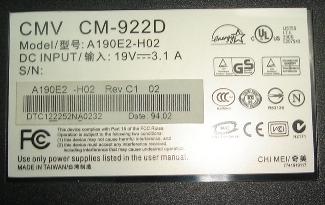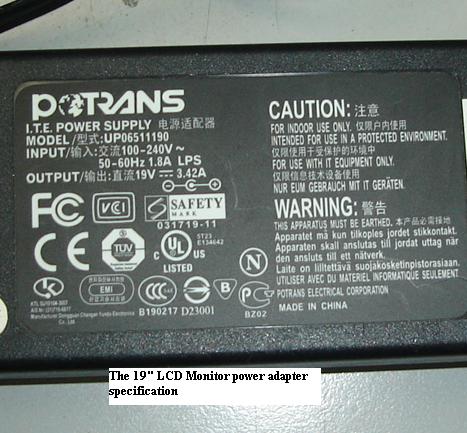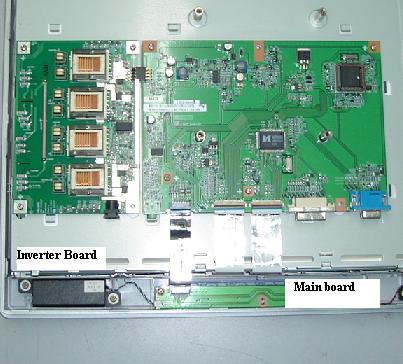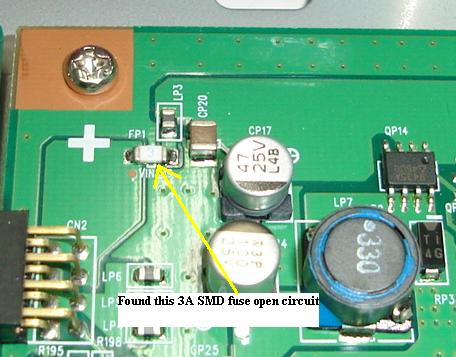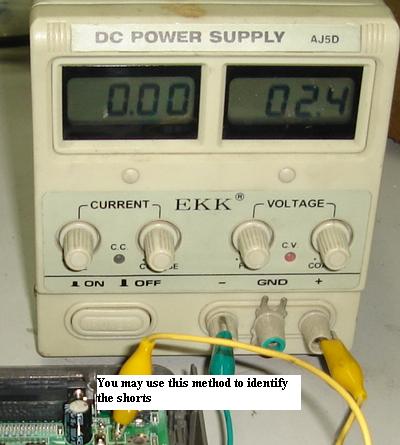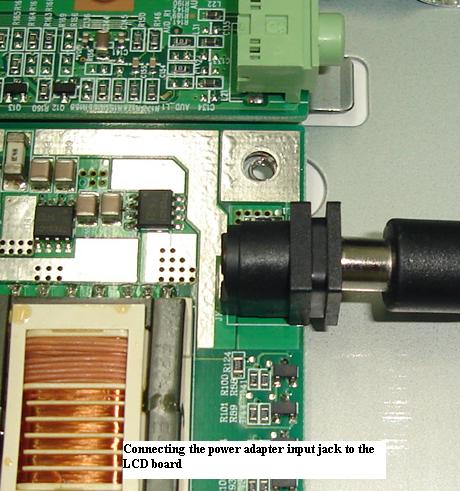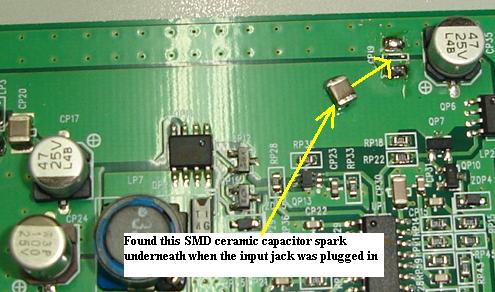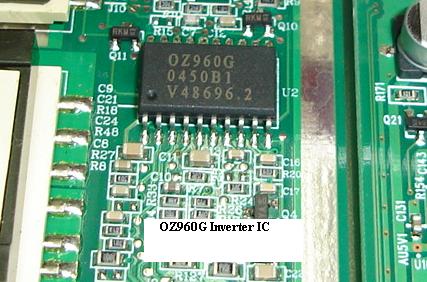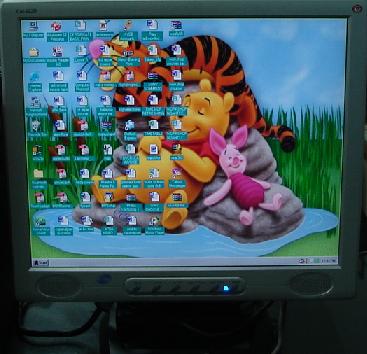19" LCD Monitor Problems-Easy Way To Repair It
Today’s article talks about repairing the CMV 19” LCD Monitor problems model CM-922D. The complain was no power as what the customer told me. This LCD Monitor power supply was not built into the circuit thus it need an external power adapter to power it up. The input to the LCD Monitor is 19V with 3.1 Amp from the adapter. Since the complain was no power, we have to test it out to check if the power adapter is at fault or the LCD Monitor.
The ac supply was plugged in to the power adapter and I could see the power LED was lighted up. Checking the output voltage of the power adapter I got about 19 volts which is good. Even though the LED has lit and correct output voltage, this doesn’t mean that the power adapter can maintain when there is a load (the LCD Monitor) connected to it. I once came across a Compaq 17” LCD Monitor that have a precise output voltage from the power adapter but when connected to the Monitor, the display appeared for a fraction of a second before shutting down. Usually in this case, your experienced would tell you that it could be the inverter circuit are faulty or the lamps have problem. You would be surprised that the actual cause of the LCD Monitor shutdown was due to the power adapter. It can’t sustain the output voltage when there is a load on it.
This kind of fault was normally due to a bad filter capacitors located at the output of the secondary circuit. If you have ESR meter, you can actually locate the defective electrolytic capacitors fast. If you don’t have the meter, just direct replace the caps. As mentioned in my previous repair articles, to confirm if the power adapter is truly working or not you need a light bulb to act as a load. Make sure the power LED light doesn’t blink whenever the light bulb is connected. Even if it blinks one time, this proves that the regulation is not good and need to be check entirely. In the above china made LCD Monitor, the power adapter work perfectly fine!
Since I have already confirmed that the power adapter is good, my focus now was on the LCD boards. Removing this LCD Monitor cover was very easy and you can easily access to the board when the metal casing was removed. The first thing that I checked was the SMD fuse located in the main board. If the fuse opens then there would be no supply to the ADC/SCALAR and the CPU IC thus the power LED would not light! Checking this SMD fuse was rather simple as the method of checking it is the same like a normal fuse. Use either an analog or a digital meter set to ohms range or continuity check. You can check the fuse while it is still in circuit. Yes, the fuse was found to be open circuit.
Now there is one question that needs to be answered by us. What makes the fuse to go open circuit? Well from what we have known about electronic repair, there are three possibilities as why a fuse opens circuit. First, the fuse can become open circuit due to its lifespan. Some fuses can last for many years while some only couple of years. In other words, the life span of a fuse depends on the qualities of the materials used. Secondly, the external factor such as a surge causing the fuse to open circuit in order to protect the main board. Thirdly, the main board itself have problem (such as a shorted IC’s and other electronic components) that caused the fuse to open circuit.
If the LCD Monitor problems falls in the first and the second categories then replacing only the fuse will definitely solve the problem. However, for this LCD Monitor, replacing only the fuse didn’t work at all and the fuse open circuit again. You have only two choices to solve this kind of problem. First you can use an external regulated power supply as explained in my previous repair articles and connect the negative output of the power supply to ground and the positive to the fuse (the line that leads to other circuitry) in order to detect the short circuit. Slowly vary the output voltage and monitor the current drawn. Once the current drawn about a amp or two, now place your finger to any electronic components in the main board. If you found any components that get very hot then that is the cause of the short circuit.
In this article, I’m going to do it differently to detect the short circuit. Are you ready? Now instead of replacing the fuse with the exact rating which is 3 amperes, I replaced it with a 5 amperes fuse. The purpose for me to put the 5 amp fuse instead of the 3 amp fuse was because “if the fuse doesn’t blow then the component that have short circuit would blow”. Do you get the idea? Three things can happen when you use this way to force out the culprit. First the power adapter may shut down due to heavy current draw from the main board. Second, the short circuit electronic components (either be a IC, diode, capacitors, transistor and etc) will get hot and you can quickly locate it easily by touching them. Remember don’t on it for too long otherwise if the shorted components get too hot it will go open circuit and now you will have a hard time to locate the fault. Third, you may hear a pop sound and spark from the shorted component. Trace from where the spark came from and you can easily identify the location and sometimes to the actual component that generate the spark.
For the above LCD Monitor, I actually saw a small spark at the top part of the main board once the power input jack was connected. It prompted me to the exact location and when I check the SMD ceramic capacitor (that generated the spark underneath it) with analog meter set to X 10 K ohm range; it actually developed a slight short circuit. Replacing only the fuse and the SMD ceramic capacitor solved the no power problem in this 19” LCD Monitor. This Monitor uses the inverter IC (OZ960G), A1084-25CM (2.5 volts voltage regulator), AMC1117-3.3 (3.3 volts voltage regulator), ADC IC (MST8136B) and CPU IC (MYSON MTV312MV64).
Conclusion-There are always options as to which methods that you want to use to detect the short circuit. If you prefer the latter one, then I suggest you to take some photo shots first before anything really burnt out beyond description. With the photos, at least it will give you some hints of what the components might be or even the part numbers. Well, there’s always an interesting way to solve electronic problems and this is one of the reason that I like electronic repair so much because you can always act as a detective to find out the culprit-real satisfaction! Oh! By the way, you can use the above method to any other electronic equipment and it is not limited only to LCD Monitor problems (repair). Have a great hunt my friend!
|
|
Copyright@ 2006-2014-www.ElectronicRepairGuide.com All Rights Reserved
